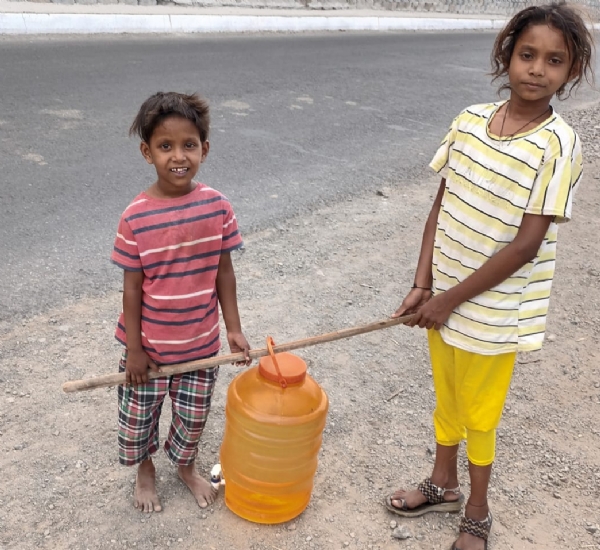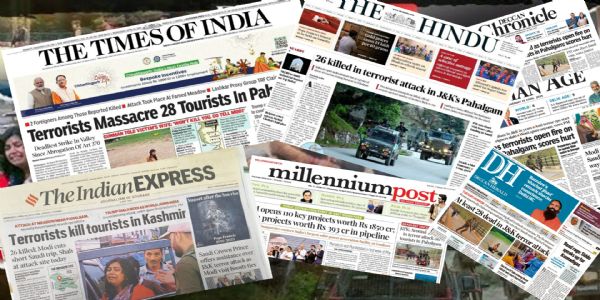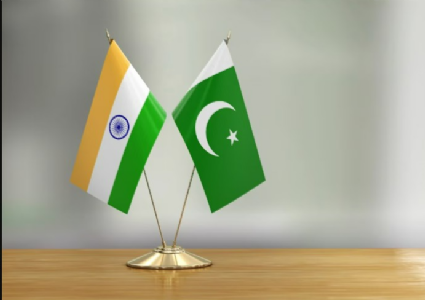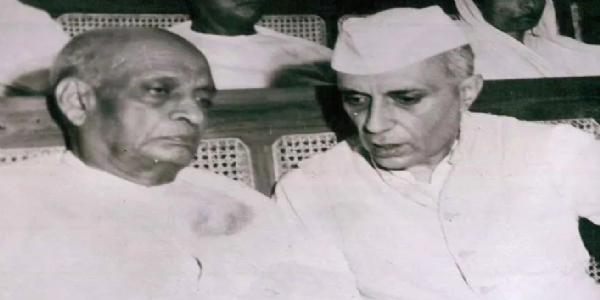Two Childhoods, Stark Contrast
A chance encounter with two contrasting childhoods—one carefree and nurtured, the other burdened yet resilient—raises powerful questions about inequality, access to education, and our collective responsibility. This reflection explores the gaps in opportunity, the role of awareness, and how society must act to ensure no child is left behind.
Total Views | 92
A couple of days ago met a cute boy. We were enjoying our tea at the DES campus near the management college. It was really crowded, all were busy with their food for stomach and thought. A cute boy who was probably of the KG age was happily running around. He was not interested in eating, maybe he had finished eating. As he was moving in the canteen, my husband stopped him. He gave a pleasant smile and raised his eyebrows, as if asking why was he stopped. My husband asked him what his name was, and he answered आदि and spelt it, ADI, emphasising every syllable carefully. We all had come across spelling the name along with the verbal communication for the first time. He made it doubly sure that his name is properly understood.

When we curiously asked about his friends' names, quick came the names. When enquired about his teachers, he stated that two teachers for his class engage them daily, and said that he likes one teacher very much. We were amused and asked why he liked her so much. With sparkling eyes, he said that she speaks very softly and even scolds softly. He ran away gleefully. A happy, almost with no tension, fair complexion child with radiating face compelled all to glance at him several times. He made our day.
Yesterday, we had been near Jejuri for some work, when it finished went a little ahead in search of a location. The roads are being constructed, we passed by a couple of bridges. A few kilometres away, construction work for a bridge was in progress, so, we took the service road. Suddenly happened to notice two children, a boy who probably was 4 to 5 years old and a girl who was a couple of years older than him. They were trying to carry a drinking water container, which was a very big bottle, probably with 10 litres or of slightly more capacity. They used a sturdy stick so they both could hold it at two ends. They would walk a few hasty steps and rest the bottle for few seconds and repeat the exercise. Amused, we stopped, and I walked back, tried talking to them. They were carrying the drinking water and had to walk at least 3 to 4 hundred metres for every errand. Probably one more errand was required to have a sufficient quantity of water.
They could not understand Marathi, so they answered me in Hindi. They said if they could not get water, then Amma had to do the job. Both the parents were working as daily wage workers on some construction site. I praised them for the thought of helping their mother, I said God bless them and clicked a photograph, taking their permission to do so. As I was a little away from our vehicle, my husband started taking reverse. I was not aware, but the children saw it, left everything in a hurry and ran away, disappearing on the other side of the road. Tried finding them in vain. So moved ahead, a woman was standing by the roadside when I showed her the photograph and enquired about the children. She smiled and showed them their house, which was in the narrow lane where we were standing. She said the children were afraid as the car started advancing backwards, thinking there was some danger. Her son ran down
the lane, convinced them that we came to appreciate them and wanted to give them a big watermelon we had with us. In a way, it made us a little amused looking at their alertness.
A couple of gentlemen, women and someore children too gathered. I told them the entire story. All smiled. One gentleman said that though they are smart, they must enrol in the nearby school. They just wander around to pass the time. Parents have to work to keep life going. The father of one child had a good education, but still, he doesn't insist on schooling. What kind of future would they have? Would they be able to earn a living?
These were the questions no one had any answer to. Maybe the parents keep changing places as per the need, maybe they do not have a permanent work. Our government has made the education free and compulsory till the class seven. Still, many are outside the realm of education. Uniforms, books and even meals are provided in the schools, but probably this does not sufficiently attract the children or parents. They were illiterate. I could not believe what I saw. Though they were illiterate, they had learned some lessons and valuethe s hard way.
They were subject to harsh realities, were not averse to physical work, though it was a very difficult task. They too were happy, alert and smart in their own way, and did not trust strangers. Knew how to save themselves. The boy was of Adi's age. As Adi was oblivious to this kind of reality, he too was not aware of Adi's world of comfort and convenience.
How can such children be brought into the net of the education system? How can a better future be ensured for them? How can life quality be enhanced? Many questions, but no easy and concrete solution at this point in time.
At the same time, how to make our children aware of the reality that there is a different world that exists. Middle-class families mostly select English medium unaided schools for educating their children, in the later phase again mostly they enrol in unaided institutions and land up working with some good organisations, and might get detached from the bitter truth of life. The challenge is how to develop belongingness to the society or readiness for inclusivity. Their ignorance about it makes their understanding incomplete. How can this be made part of their world? Something must be done from the school level. How do we inculcate the values and understanding of the underprivileged, cruel world or the quarters with no facilities of upliftment?
As a mother, too, I had the same concern. Fortunately, my younger daughter's practical work for her physiotherapy degree had hospitals like Sasoon and Tarachand included. That made her aware of the harsh realities of life, but many streams would not have such facilities.
Adi is a very innocent and cute happy child, probably he will probably have all the possible opportunities to develop, polish and strengthen his skills. But the question of such children keeps raising its head now and then.
Again and again, I remember the philosophy of Shri Deen Dayal Upadhyay Ji. He stated that if some individuals are left out of the education system and cannot get opportunities to develop their potential, it is not only the loss of the person deprived, but it is the loss of the society more. Society would not get skilled hands for a particular kind of role. The expenditure on education ought to be viewed as an investment in development and prosperity. Everything right from awareness to actual education, is to be taken care of by society.

When we curiously asked about his friends' names, quick came the names. When enquired about his teachers, he stated that two teachers for his class engage them daily, and said that he likes one teacher very much. We were amused and asked why he liked her so much. With sparkling eyes, he said that she speaks very softly and even scolds softly. He ran away gleefully. A happy, almost with no tension, fair complexion child with radiating face compelled all to glance at him several times. He made our day.
Yesterday, we had been near Jejuri for some work, when it finished went a little ahead in search of a location. The roads are being constructed, we passed by a couple of bridges. A few kilometres away, construction work for a bridge was in progress, so, we took the service road. Suddenly happened to notice two children, a boy who probably was 4 to 5 years old and a girl who was a couple of years older than him. They were trying to carry a drinking water container, which was a very big bottle, probably with 10 litres or of slightly more capacity. They used a sturdy stick so they both could hold it at two ends. They would walk a few hasty steps and rest the bottle for few seconds and repeat the exercise. Amused, we stopped, and I walked back, tried talking to them. They were carrying the drinking water and had to walk at least 3 to 4 hundred metres for every errand. Probably one more errand was required to have a sufficient quantity of water.
They could not understand Marathi, so they answered me in Hindi. They said if they could not get water, then Amma had to do the job. Both the parents were working as daily wage workers on some construction site. I praised them for the thought of helping their mother, I said God bless them and clicked a photograph, taking their permission to do so. As I was a little away from our vehicle, my husband started taking reverse. I was not aware, but the children saw it, left everything in a hurry and ran away, disappearing on the other side of the road. Tried finding them in vain. So moved ahead, a woman was standing by the roadside when I showed her the photograph and enquired about the children. She smiled and showed them their house, which was in the narrow lane where we were standing. She said the children were afraid as the car started advancing backwards, thinking there was some danger. Her son ran down
the lane, convinced them that we came to appreciate them and wanted to give them a big watermelon we had with us. In a way, it made us a little amused looking at their alertness.
A couple of gentlemen, women and someore children too gathered. I told them the entire story. All smiled. One gentleman said that though they are smart, they must enrol in the nearby school. They just wander around to pass the time. Parents have to work to keep life going. The father of one child had a good education, but still, he doesn't insist on schooling. What kind of future would they have? Would they be able to earn a living?
These were the questions no one had any answer to. Maybe the parents keep changing places as per the need, maybe they do not have a permanent work. Our government has made the education free and compulsory till the class seven. Still, many are outside the realm of education. Uniforms, books and even meals are provided in the schools, but probably this does not sufficiently attract the children or parents. They were illiterate. I could not believe what I saw. Though they were illiterate, they had learned some lessons and valuethe s hard way.
They were subject to harsh realities, were not averse to physical work, though it was a very difficult task. They too were happy, alert and smart in their own way, and did not trust strangers. Knew how to save themselves. The boy was of Adi's age. As Adi was oblivious to this kind of reality, he too was not aware of Adi's world of comfort and convenience.
How can such children be brought into the net of the education system? How can a better future be ensured for them? How can life quality be enhanced? Many questions, but no easy and concrete solution at this point in time.
At the same time, how to make our children aware of the reality that there is a different world that exists. Middle-class families mostly select English medium unaided schools for educating their children, in the later phase again mostly they enrol in unaided institutions and land up working with some good organisations, and might get detached from the bitter truth of life. The challenge is how to develop belongingness to the society or readiness for inclusivity. Their ignorance about it makes their understanding incomplete. How can this be made part of their world? Something must be done from the school level. How do we inculcate the values and understanding of the underprivileged, cruel world or the quarters with no facilities of upliftment?
As a mother, too, I had the same concern. Fortunately, my younger daughter's practical work for her physiotherapy degree had hospitals like Sasoon and Tarachand included. That made her aware of the harsh realities of life, but many streams would not have such facilities.
Adi is a very innocent and cute happy child, probably he will probably have all the possible opportunities to develop, polish and strengthen his skills. But the question of such children keeps raising its head now and then.
Again and again, I remember the philosophy of Shri Deen Dayal Upadhyay Ji. He stated that if some individuals are left out of the education system and cannot get opportunities to develop their potential, it is not only the loss of the person deprived, but it is the loss of the society more. Society would not get skilled hands for a particular kind of role. The expenditure on education ought to be viewed as an investment in development and prosperity. Everything right from awareness to actual education, is to be taken care of by society.
Bharati Web








